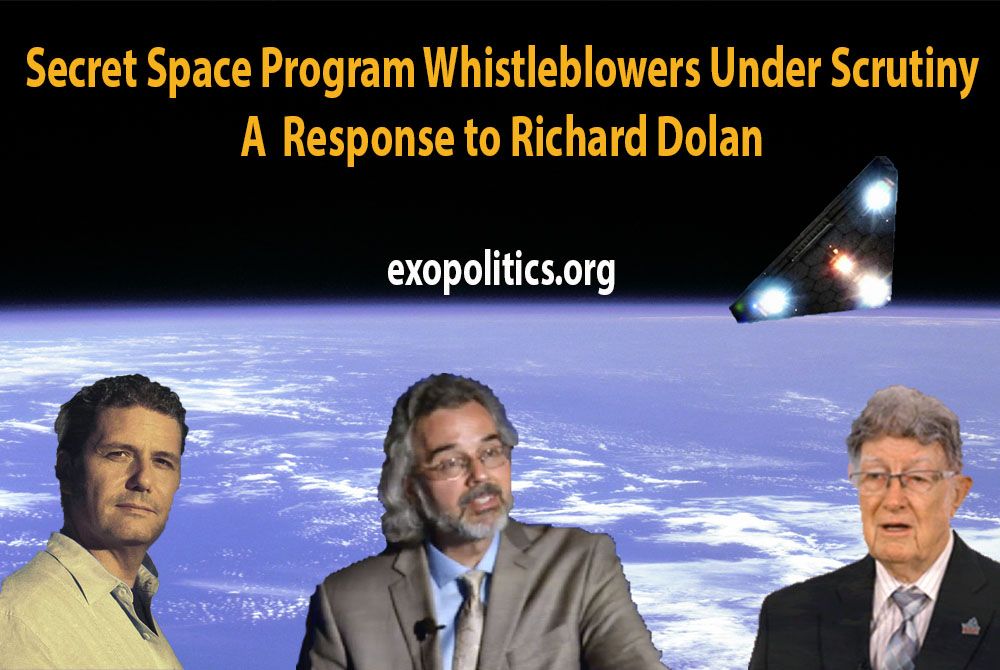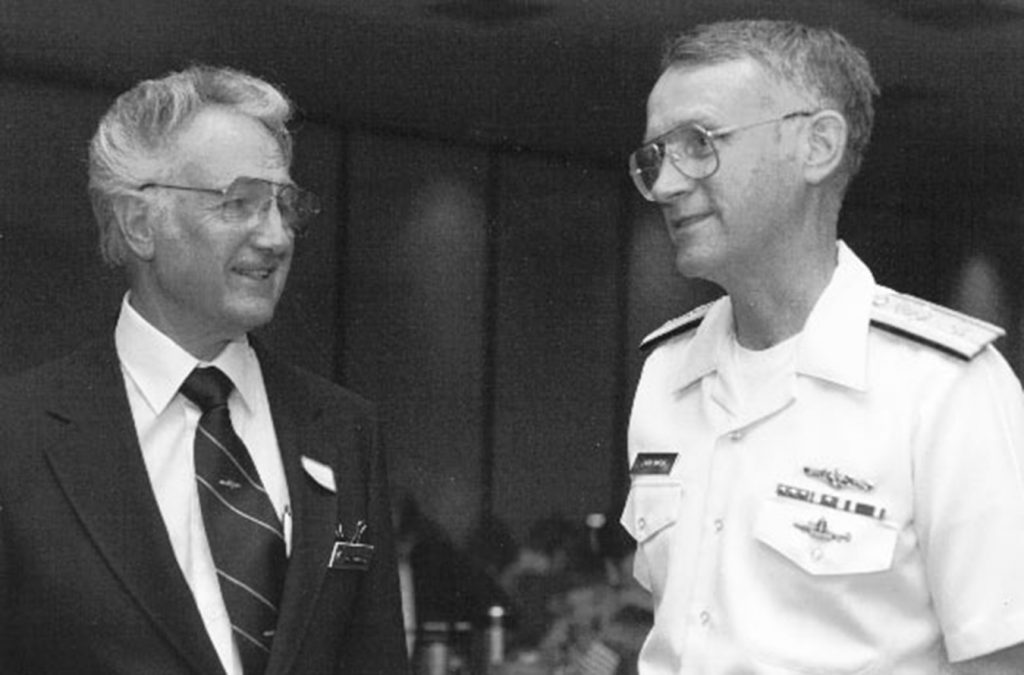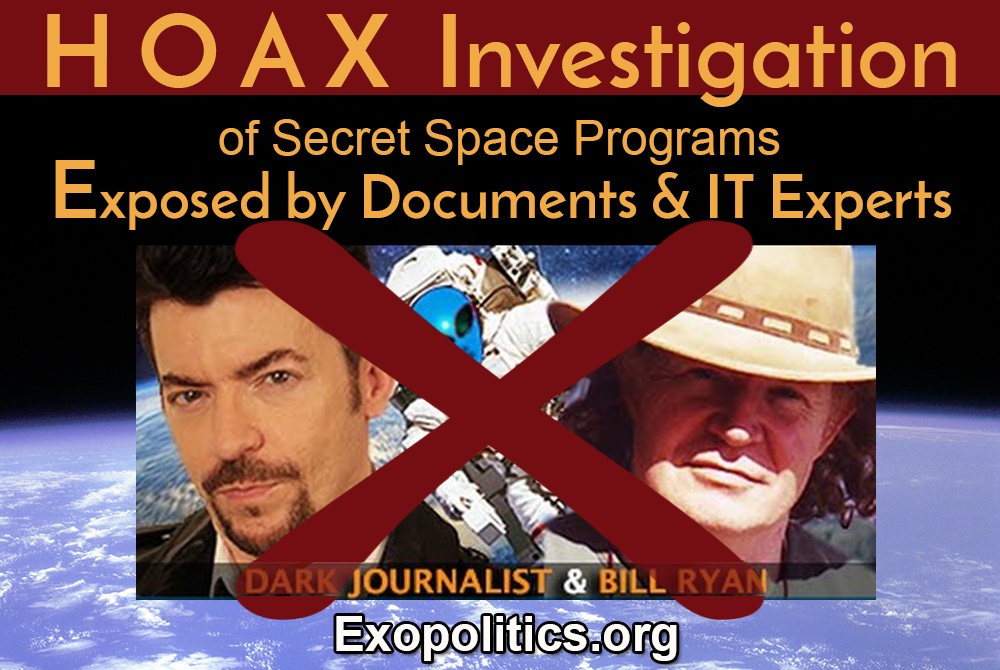
Secret Space Program Whistleblowers Under Scrutiny – Response to Richard Dolan
On July 16, leading UFO historian, Richard Dolan, released an article setting out his views about how to assess individuals who have claimed to have direct knowledge and experience concerning secret space programs. He explains his sympathy for the view that such programs exist, and that people have been through these programs where they have or want to come forward with what they know.
However, he describes his general skeptism about individuals who not only claim to be whistleblowers with detailed knowledge about secret space programs, but who also achieve a certain degree of public acceptance, while providing no evidence in support of their claims:
But when it comes to significant claims being made–really big claims that are not only radical on their own merits but which transform the field (and bring fame and money to those making them), then we clearly need a higher standard than “he seems like a good guy with a detailed story so I believe him.”
Richard views such individuals as wittingly or unwittingly muddying the waters, making it increasingly difficult for independent researchers seeking to ascertain the truth about these programs.
He describes three whistleblowers in particular who have come forward and gained a level of public attention with their incredible claims:
Some of the most prominent of these people include Andrew Basiago, Randy Kramer, and Corey Goode. These three individuals have each claimed to have gone to Mars for extended periods of time. That’s explosive enough, of course, but they have also stated that they have engaged in time travel.
Richard points out that the lack of evidence means that we need to take the whistleblowers word for it, which can be a dangerous thing for researchers:
Again, I must emphasize that none of these whistleblowers has made a claim that an independent investigator can confirm. Everything is based on trust. Believing such stories without genuine evidence takes us down a dangerous road within an already treacherous field that is constantly in the crosshairs of a skeptical establishment.
He is here attempting to steer what he perceives to be the middle path between a highly critical group of skeptics and debunkers claiming such whistleblowers are, at best, delusional or at worst pathological liars, and supporters accepting whatever the whistleblowers have to say on trust alone.
Richard refers to a series of emails he received encouraging him to come out against Goode in particular, who has recently been subjected to sustained criticism from Bill Ryan and Daniel Liszt (aka Dark Journalist) in a series of interviews. Ryan and Liszt have been a focal point for an internet campaign to discredit Goode as a pathological liar.
I have responded to their alleged impartial investigation of Goode elsewhere in terms of how they ignore documents and expert testimonies that validate Goode’s claims about his two-decades long background in the Information Technology industry. By ignoring Goode’s verifiable background, both investigators have deliberately attempted to cast doubt on his credibility by asserting that he came forward purely for monetary gain, as opposed to genuine whistleblower’ desire to reveal the truth about official wrong doing even at the cost of a once lucrative career.
I have reached out to Richard to share my assessment of Ryan and Listz’s hoax investigation, and included a link to the documents and experts I contacted and who corroborated Goode’s background. Richard has not replied, which I find surprising. Surely the willful obfuscation of a whistleblower’s background deserves public scrutiny and rebuke when investigators have acted inappropriately!
Yet apparently, Mr Dolan doesn’t agree. He doesn’t bring up any problems with Ryan and Liszt’s investigation of Goode in his post, but he does mention a problem with me. Apparently I have a trust issue:
I’ve known Michael for over a decade, and have had several long conversations with him. What I say here I have said to him personally: I believe he has done genuine and good research on a number of matters, but has a tendency to be too trusting. From my perspective, it’s always been like that. There are people who love his work, and there are haters. I am neither, but am always looking for information I can use. Sometimes I get good information and insights from his work and so I find him worthwhile to listen to, even if I don’t approve of his quickness to jump to conclusions.
I find Richard’s assessment that I have a “tendency to be too trusting” unsurprising since it reflects my contrary view of his tendency to be too dismissive of those sincerely and honestly stating their experiences. They may well be telling the truth about extraordinary experiences, but are dismissed simply because they don’t provide sufficient evidence to satisfy whatever standard he and other UFO researchers arbitrarily set.
To me, it has always been far more dangerous to exclude witness testimony simply because they don’t provide sufficient evidence to some arbitrarily defined standard, as opposed to seriously investigating it based on their sincerity, honesty and often sacrifice in coming forward.
It’s wrong to assume that an investigator “trusts” a whistleblower simply because he or she consider them sincere and thus worthy of serious investigation. I have found the above three whistleblowers sincere and worthy of serious investigation. That doesn’t translate into trust, however, which is a different thing altogether.
Richard Dolan and I agree that the entire subject matter of UFOs, extraterrestrial life and secret space programs is very highly classified, and that security measures have been implemented to perpetuate this. Indeed, the Edward Snowden document release confirms that the intelligence community in the five Echelon countries (USA, Britain, Canada, Australia and New Zealand) does perform covert online activities to sow confusion in the UFO field.
Richard believes that it stands to reason that the Deep State (aka Cabal/Illuminati) would attempt to muddy the waters by arranging for hoaxers, mind-control victims, assets, etc., to come in with false testimonies and disinformation. On this we agree, but it also stands to reason that there would be a lot of effort put in as well to discredit genuine whistleblowers, experiencers, etc., by the Deep State and its assets.
Why only focus on one aspect of what the Deep State is doing? After all, in the case of Corey Goode, I’ve found clear evidence of an underhanded attempt to smear him, where two investigators, Ryan and Liszt, have ignored documents and expert witnesses corroborating his work history, and claims in this regard. Couldn’t Ryan and Liszt be Deep State operatives who have been activated to discredit Goode?
Richard then takes on the case of William Tompkins, who unlike Goode, Basiago and Cramer, has numerous documents and experts supporting key aspects of his testimony. He says:
Bill Tompkins is an interesting case. He is in his 90s, and recently wrote a book entitled Selected by Extraterrestrials, which details his life and claims about having participated in the Navy’s top secret program to create a secret space fleet. Unlike the other alleged whistleblowers, Tompkins has a career that has been confirmed: he did work at Douglas Aircraft for many years and has very impressive credentials. That counts for something. I should add that Dr. Salla and Dr. Bob Wood have both done a great deal of work to investigate and confirm Tompkins’ background and found what they believe is at least some corroboration to Tompkins’ claims.
Indeed, Dr. Wood and I have found many documents and independent third parties supporting Tompkins’ testimony. I spoke with three retired Navy officers, who all vouched for Tompkins bona fides and aspects of his testimony which I detailed in my book The US Navy’s Secret Space Program and in earlier articles.

Despite this abundant pool of evidence which has been publicly available for some time now, Richard Dolan remains on the fence about Tompkins:
Even so, I have my doubts about Mr. Tompkins. It’s not widely known, but I had the opportunity to be his publisher. After I learned about his credentials from Bob Wood, but before I read his manuscript, I had agreed in principle that I would publish it. But after reading the manuscript, I had to decline. I found the tone of this book to be perfectly designed to bring disrepute to the field and I wanted nothing to do with it. I found a number of obvious errors in the book and what seemed to me examples of self-aggrandisement that didn’t sit well with me. I wished Tompkins well and that was that. I haven’t made my final judgment on Tompkins, and perhaps I never will. If evidence can be brought forth to substantiate his key claims, then I will look at it.
Tompkins’ tone, draft book errors and self-aggrandisement were red flags to Dolan so he backed off. That’s fair enough for any publisher assessing a potential book, however, these are not things that would exclude Tompkins from being truthful in his recollections of events and people as he best recalls.
After all, Tompkins is 94 and was part of historic process which has culminated in the present state of affairs concerning secret space programs. I personally gave Richard a copy of my US Navy Secret Space Program book in which I lay out the evidence as I have so far been able to find.
Richard finishes his article by saying:
I remain willing to engage in a civil discourse with Corey, Andrew, Bill Tompkins, Michael Salla, or anyone else who has made claims. In a sense, I understand their position, since I know what it’s like to speak to staunch skeptics about the UFO subject. However, in any sort of engagement I have with such people, they must realize that the onus is on them to provide their evidence. That is what I do regarding UFOs. A story that is inherently unverifiable just doesn’t count, nor does it help if some other random person seemingly supports the story. Words alone aren’t good enough. Nothing can be taken at face value.
I am happy to engage in a civil discourse with Richard about the issues he has raised in his article and what I have pointed out in this reply. I consider him as someone with the kind of intellectual rigor and forthrightness that makes a public debate on these issues something valuable for all readers.
In finishing, I do have to express my disagreement with his conclusion that a story that is “inherently unverifiable just doesn’t count”. Just think of the implications of eyewitness testimony to crimes being dismissed because there is no evidence they provide, or means of investigating the veracity of their claims, which may appear incredible given the present level of technological awareness in open source society.
Wouldn’t that play into the hands of criminal syndicates with the power to remove and manipulate incriminating evidence? My conclusion is that this is precisely what is happening when it comes to learning the truth about secret space programs, the groups running these operate very similarly to criminal syndicates under the cover of national security.
All testimonies count. We can learn a lot by both exposing those out to hoax us or who act out of delusion, as well genuinely investigating those telling us the truth as best as they recollect. Throwing the baby out with the bathwater is precisely what the Deep State wants us to do when it comes to assessing incredible whistleblower claims about secret space programs.
© Michael E. Salla, Ph.D. Copyright Notice
Further Reading
- Hoax Secret Space Program Investigation Exposed by Documents & IT Experts
- As Corey Goode Secret Space Program Claims go Viral Critics Step up Attacks
- Wife of Secret Space Program Whistleblower Emerges with Corroborating Eyewitness Testimony
- Evidence grows for secret space program disclosures & crimes against humanity trials
- Astropolitics and the Exopolitics of Unacknowledged Space Activities
- William Tompkins and US Navy Secret Space Program
Corey Goode, Michael Salla, Richard Dolan, secret space programs, whistleblowers, William Tompkins
